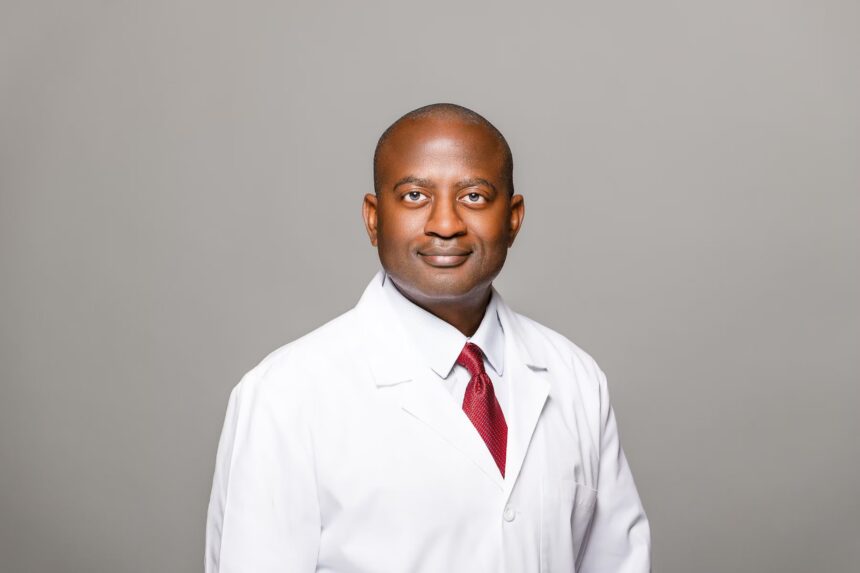When it comes to artificial intelligence in health technology, few Nigerians have made the mark like Dr Stephen Odaibo.
Born and raised in Ilorin, Kwara State Nigeria, Odaibo moved to the United States to further his education, a journey that laid the foundation for his groundbreaking work in AI and medicine.
Odaibo’s academic journey is remarkable. He earned both a Bachelor of Science and Master of Science in Mathematics through a fast-track programme at the University of Alabama, Birmingham, while simultaneously completing pre-med requirements.
He went on to earn a Master’s in Computer Science at Duke University in 2009, followed by an MD in Neurology and Neurochemistry from Duke University School of Medicine in 2010.
This combination of mathematics, computer science, and medicine equips him with a rare perspective, one he has leveraged in founding Retina-AI Health.
About Retina AI Health
Odaibo’s startup, Retina AI Health, uses AI to detect systemic diseases through eye imaging. The company focuses on conditions such as diabetic retinopathy, which affects half a billion people worldwide.
“It’s quite a simple idea. We’re going after systemic diseases that you can screen for in the eye,” he told Techpoint Africa. “You can find out if somebody is likely to die of a heart attack or if somebody is developing Alzheimer’s with a simple picture of their eye. You don’t need to do a blood test or anything like that.”
The AI analyses retinal images in the cloud within seconds, providing diagnostic insights without the need for scarce retina specialists, a significant bottleneck in countries like Nigeria and the US.
Odaibo said the most obvious problem the startup is going after is diabetic retinopathy because half a billion people in the world have diabetes.
“So we take a picture of the eye, and then we use the AI immediately in the cloud. The AI will tell you in three to four seconds whether this person has this disease or not in their eye,” he said.
Knowing Deep EigenMatics
Beyond diagnostics, Odaibo is exploring AI’s potential in drug discovery through his company Deep EigenMatics. Traditional drug development is expensive and time-consuming, costing around $2.6 billion and taking 10–15 years per drug.
“Imagine what happens after spending so much money over so many years, only for the whole thing to fall through,” Odaibo said. This is where AI comes in; it helps you get the right drug early.”
In 2025 alone, he has filed several patents and recently received two US patents for innovative AI technologies in drug design. According to him, his work aims to improve drug efficacy, minimise side effects, and make pharmaceutical research more efficient.
Africa’s Opportunity in AI and Health Tech
Odaibo believes Africa has a unique opportunity to leapfrog traditional development pathways by connecting education, technology, and commerce.
According to him, by focusing on practical solutions, Africans can contribute to prosperity while addressing pressing healthcare and technological challenges.
“For a place to be prosperous, it means you’re solving people’s problems. And there are 8.2 billion people on the earth with all sorts of problems that can be solved,” he said.
The global artificial intelligence in diagnostics market is expected to expand from $1.97 billion in 2025 to $5.44 billion by 2030, with advanced imaging and predictive analytics improving disease detection and patient outcomes across hospitals and clinics worldwide.
Analysts say that these trends highlight the influence of AI technologies in both diagnostics and drug development, underscoring the relevance of innovators like Dr Stephen Odaibo, who are applying AI to solve global health challenges.
Talking Points
Dr Stephen Odaibo’s work at Retina AI Health demonstrates how artificial intelligence can address critical gaps in healthcare delivery, particularly in diagnostics for systemic diseases like diabetic retinopathy.
By enabling rapid, accurate disease detection without the need for a specialist, his technology tackles a significant shortage of trained medical professionals in Nigeria and other parts of Africa.
At Techparley, we see Odaibo’s approach as a blueprint for how AI can be applied to solve real-world problems, not just in the US but globally. His work highlights the potential for African innovators to leapfrog traditional healthcare challenges by combining technology, medicine, and data science.
Finally, we see a significant opportunity for Africa to commercialise AI technologies in ways that solve urgent healthcare problems, create economic value, and improve lives. With the right strategy and support, AI-driven health-tech solutions can become a cornerstone of Africa’s innovation ecosystem.
————————
Bookmark Techparley.com for the most insightful technology news from the African continent.
Follow us on Twitter @Techparleynews, on Facebook at Techparley Africa, on LinkedIn at Techparley Africa, or on Instagram at Techparleynews.






